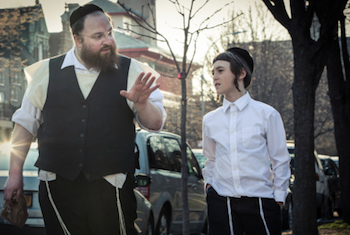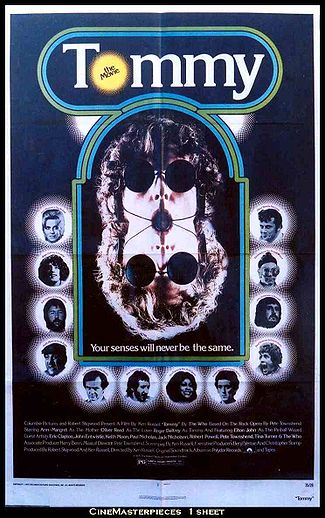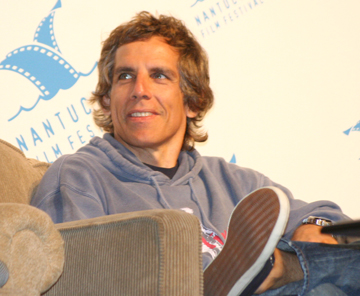|
|
||
|
Pro Tools
FILMFESTIVALS | 24/7 world wide coverageWelcome ! Enjoy the best of both worlds: Film & Festival News, exploring the best of the film festivals community. Launched in 1995, relentlessly connecting films to festivals, documenting and promoting festivals worldwide. Working on an upgrade soon. For collaboration, editorial contributions, or publicity, please send us an email here. User login |
New Directors/New Films: "Menashe"
Menashe, the title of Joshua Weinstein’s fiction feature debut, could just as easily been called Schlimazel. Set amid the Hasidic quarter of Borough Park, Brooklyn, it follows the eponymous character as he navigates serial misfortune. His wife Leah died nearly a year ago; his low-paid grocery store job is on the line; and his lax approach to tradition puts him out of step with the rabbi (Meyer Schwartz) and community.
However, the worst may be yet to come: losing custody of his 10-year-old son Rieuven (Ruben Nyborg) to his righteous brother-in-law Eizik (Yoel Weisshaus). The well-off realtor and his family have taken the boy in since Leah’s death. There Rieven enjoys proper meals and surroundings, not the cake and Coke that pass as breakfast at home when his dad oversleeps. Yet Eizik’s household lacks the natural warmth that Menashe lovingly gives his only bundle of joy. As the story unfolds, mostly in Yiddish, you can almost hear a fiddler on the roof argue, “On the other hand...” Yet with Weinstein’s intimate touch, this is believable human drama, not the stuff of folklore. It also helps that he and fellow screenwriters Alex Lipschultz and Musa Syeed give specific detail about the strictures that command an individual within an ultra-Orthodox community such as the one featured onscreen. For example, custom dictates that Menashe remarry to be a proper parent; and his continued bachelorhood could cost Rieven his place at school. But the made-to-be-henpecked widower dreads another contentious union like the one he apparently had with Leah. Not that he doesn’t miss his wife. It’s easy to see why from a scene with a prospective match made by a local yenta. Menashe has sufficient agitas without a hostile live-in partner. For one, there’s Leah’s memorial dinner that’s fast approaching. Menashe fights to hold it in his modest apartment, overcoming pushback from both Eizik and the Rabbi. If Menashe can pull off the big occasion – potato kugel and all -- he can prove his chops as a responsible mensche. That and a new wife, and he’s all set. Or is he? If ever character were destiny, Menashe’s is that vehicle. The screenplay by Weinstein and his co-writers Alex Lipschultz and Musa Syeed launch an advanced study in schlubdom with neither meanness nor judgement but rather with compelling empathy. Menashe may be a screw up, but somewhere under that scruffy beard and doughy paunch, he may have just enough self-confidence and self-knowledge to get his bashert (intended). If the movie feels lived in, that’s because it draws on situations experienced by its lead actor, Brooklyn comedian Menashe Lustig. Add to that the verite sensibility that Weinstein brings to the project from his documentary career, and the proceedings take on a naturalistic texture. A particularly raw emotional moment comes when Menashe lets down his guard on a beer break with his Latino coworkers. In accented English, he tells the painful story of his arranged marriage. Lustig manages the neat trick of reinforcing his character’s – and presumably his own -- cultural differences while revealing the universality of his human condition.
Menashe, for all of his cloddishness, may just be the most delicate soul in Borough Park. Like the baby chick that Menashe brings Rieven as a pet to care for, he has a fundamentally sweet nature and doesn’t “need to be a big shot.” If only his emotional skills as a father extended to other spheres of his life. There’s a glimmer of hope, you can glean towards the close when Menashe submerges himself in the ritual bath, or mikveh. Yet you’d need to know a mite more about what makes Menashe tick to indulge such a prayer. Ultimately the climactic water scene exposes unexplored spiritual terrain first touched on with an early pronouncement, “Being clean on the outside makes you clean on the inside.” To end with a purifying ritual begs the question of what befouled, unwholesome notions Menashe harbored in his kishkis in the first place. Insecurity? Lack of self-regard? Even a tinge of self-loathing? Perhaps that’s the point: the worst sin of all is harboring tainted thoughts towards oneself. Happily, the film shows why the man deserves true empathy. Why else would it be called Menashe? Menashe is a selection of the 2017 New Directors/New Film series at the Film Society of Lincoln Center and Museum of Modern Art. 14.03.2017 | Laura Blum's blog Cat. : Joshua Z Weinstein Menashe Menashe Lustig yiddish Independent
|
LinksThe Bulletin Board > The Bulletin Board Blog Following News Interview with EFM (Berlin) Director
Interview with IFTA Chairman (AFM)
Interview with Cannes Marche du Film Director
Filmfestivals.com dailies live coverage from > Live from India
Useful links for the indies: > Big files transfer
+ SUBSCRIBE to the weekly Newsletter Deals+ Special offers and discounts from filmfestivals.com Selected fun offers
> Bonus Casino
User imagesAbout Laura BlumThe EditorUser contributions |






























